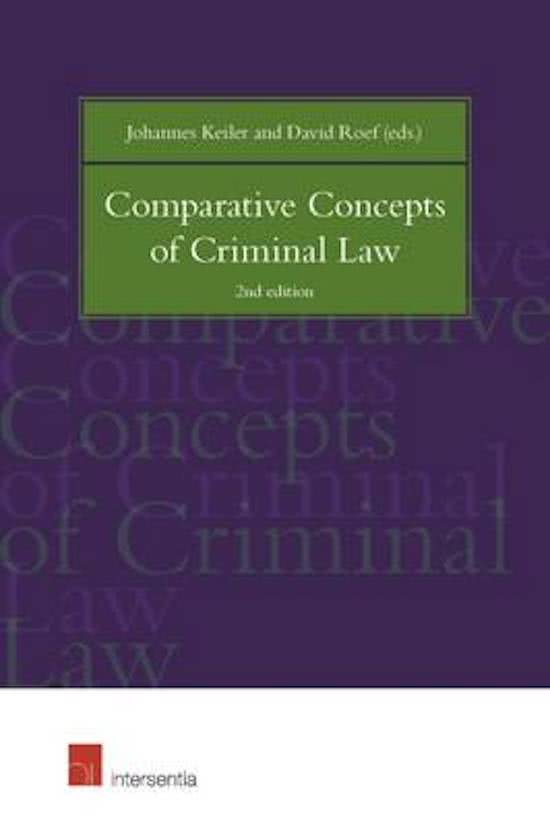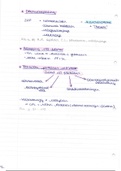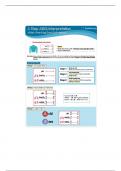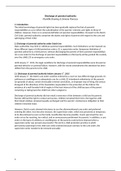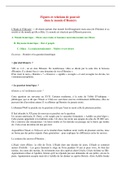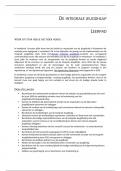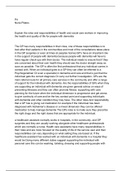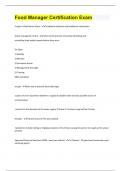Substantive Criminal Law
Week 5:
Chapter 8: Inchoate Offences: Attempts and Preparation
Criminal liability is based upon a complete offence, i.e. the perpetrator has committed the
actus reus with the necessary mens rea. It is primarily backward looking and retributive by
punishing wrongdoing that was already committed.
Inchoate means ‘just begun, undeveloped, incipient’ and it is accepted in all legal systems.
There are two main forms: (more traditionally) doctrine of attempt and the (relatively new)
preparatory offences.
The notion of intent only takes a subsidiary position in the analysis of criminal liability.
Fletcher: there is a tension between the pattern of manifest criminality in contrast to the
pattern of subjective criminality.
- Manifest criminality: Begins with liberty and insists that citizens in a liberal state ought
not to be punished unless they commit a wrongdoing which constitutes an
unreasonable risk of harm to others. Criminal liability ought to require an act that is
objectively criminal.
- Subjective criminality: Departs from the assumption that the core of criminal conduct
is the actor’s intention to harm a legally protected interest (i.e. culpability). Criminal
law ought to protect specific legal interests, and people who intend to harm such
interests are dangerous and therefore deserve punishment. Main form of criminal law
generally also requires some form of conduct for liability so the proponents of this
patterns state, is to assure the firmness of the actor’s evil intention.
The 2 patterns of criminality are often entwined in contemporary thinking about criminal law.
Since the 1990s we have shifted from a traditional welfare state into a culture of control
where the pursuit of security increasingly influences the application of criminal law and were
crime is essentially seen as a form of risk.
Preparation:
- Once a person had reached the attempt stage criminal liability would arise, while
mere preparatory conduct would fall outside the scope of criminal law. There is a
division between conduct that was quite close to the proscribed harm and constituted
a clear danger while excluding conduct temporarily further removed.
- Offences criminalising specific preparatory conduct: All penal systems have created a
multitude of specific offences that criminalise different kinds of preparatory conduct
(§149 GCC, Arts. 214 and 234 DCC, Sections 17(1) English 1981 Forgery and
Counterfeiting Act).
- Conspiracy: It criminalises preparatory conduct by proscribing the formation of an
agreement to commit a serious crime. The broadest and most controversial form of
conspiracy is the conspiracy to defraud, which is committed as soon as an agreement
to deprive another dishonestly of something can be proven.
(Section 1(1) Criminal law Act 1977, where the parties involved have agreed on a
course of conduct which if carried necessarily amounts to or involves the commission
of a criminal offence).
- English Serious Crime Act 2007: Impetus was a conceived gap and inconsistency in
the law, namely that whereas criminal liability existed at an inchoate level for
incitement, liability could not arise in cases where assistance was offered but where
the assisted offence was subsequently not committed. By expanding criminal liability
for participation in crime in several ways, a broad scheme of inchoate liability is
introduced. (Sections 44-46).
- Preparation as general doctrine in Dutch law: Initially, preparation was only
punishable in regard to joint preparatory efforts of 2 or more perpetrators, as those
Week 5:
Chapter 8: Inchoate Offences: Attempts and Preparation
Criminal liability is based upon a complete offence, i.e. the perpetrator has committed the
actus reus with the necessary mens rea. It is primarily backward looking and retributive by
punishing wrongdoing that was already committed.
Inchoate means ‘just begun, undeveloped, incipient’ and it is accepted in all legal systems.
There are two main forms: (more traditionally) doctrine of attempt and the (relatively new)
preparatory offences.
The notion of intent only takes a subsidiary position in the analysis of criminal liability.
Fletcher: there is a tension between the pattern of manifest criminality in contrast to the
pattern of subjective criminality.
- Manifest criminality: Begins with liberty and insists that citizens in a liberal state ought
not to be punished unless they commit a wrongdoing which constitutes an
unreasonable risk of harm to others. Criminal liability ought to require an act that is
objectively criminal.
- Subjective criminality: Departs from the assumption that the core of criminal conduct
is the actor’s intention to harm a legally protected interest (i.e. culpability). Criminal
law ought to protect specific legal interests, and people who intend to harm such
interests are dangerous and therefore deserve punishment. Main form of criminal law
generally also requires some form of conduct for liability so the proponents of this
patterns state, is to assure the firmness of the actor’s evil intention.
The 2 patterns of criminality are often entwined in contemporary thinking about criminal law.
Since the 1990s we have shifted from a traditional welfare state into a culture of control
where the pursuit of security increasingly influences the application of criminal law and were
crime is essentially seen as a form of risk.
Preparation:
- Once a person had reached the attempt stage criminal liability would arise, while
mere preparatory conduct would fall outside the scope of criminal law. There is a
division between conduct that was quite close to the proscribed harm and constituted
a clear danger while excluding conduct temporarily further removed.
- Offences criminalising specific preparatory conduct: All penal systems have created a
multitude of specific offences that criminalise different kinds of preparatory conduct
(§149 GCC, Arts. 214 and 234 DCC, Sections 17(1) English 1981 Forgery and
Counterfeiting Act).
- Conspiracy: It criminalises preparatory conduct by proscribing the formation of an
agreement to commit a serious crime. The broadest and most controversial form of
conspiracy is the conspiracy to defraud, which is committed as soon as an agreement
to deprive another dishonestly of something can be proven.
(Section 1(1) Criminal law Act 1977, where the parties involved have agreed on a
course of conduct which if carried necessarily amounts to or involves the commission
of a criminal offence).
- English Serious Crime Act 2007: Impetus was a conceived gap and inconsistency in
the law, namely that whereas criminal liability existed at an inchoate level for
incitement, liability could not arise in cases where assistance was offered but where
the assisted offence was subsequently not committed. By expanding criminal liability
for participation in crime in several ways, a broad scheme of inchoate liability is
introduced. (Sections 44-46).
- Preparation as general doctrine in Dutch law: Initially, preparation was only
punishable in regard to joint preparatory efforts of 2 or more perpetrators, as those

